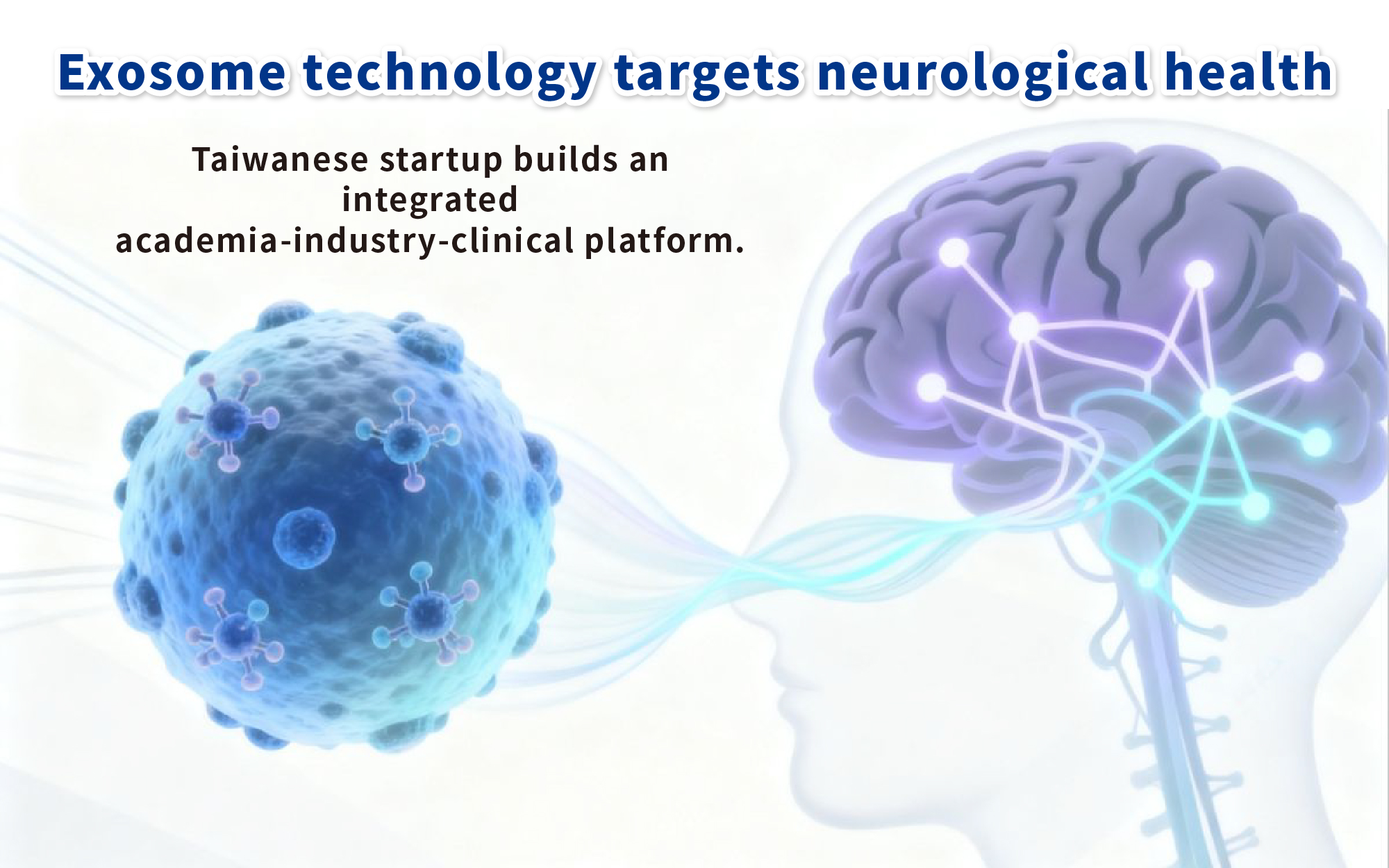2025/10/02
Editorial Column
Exosome technology targets neurological health — Taiwanese startup builds an integrated academia-industry-clinical platform.

Exosome Technology Targets Neurological Health — Taiwan Startup Builds Academia-Industry-Clinical Integrated Platform
2025 / 10 / 01
(Life Center / Comprehensive Report) Exosomes, known as the “mini couriers” of intercellular communication, with their high permeability and multiple carrier characteristics, have become a global focus in precision medicine and regenerative medicine. Taiwan Exosome Co., Ltd. (hereinafter referred to as Taiwan Exosome) has identified neurological health applications as its core development direction, partnering with leading domestic medical research institutions and standardized platforms to promote the clinical translation and industrialization of exosomes in central nervous system diseases.
From Urological Health to Neurology — Expanding Platform Applications
Taiwan Exosome has applied its self-developed exosomes in health care for the urological and reproductive systems, achieving results in preclinical animal studies, and continues to move toward productization and scale-up, while also preparing for clinical trials. By integrating cross-disciplinary R&D and standardized preparation, the company is building a modular platform to explore potential applications in non-invasive interventions and chronic health management, demonstrating strong technological scalability and commercial potential.
Taiwan’s Advantages and Strong Industrial Foundation
Taiwan boasts a complete biomedical supply chain, strengths in clinical medicine, and supportive regulatory frameworks. In June 2024, the Legislative Yuan passed the Regenerative Medicine Act, gradually establishing a comprehensive regulatory system for cell and exosome R&D, manufacturing, clinical trials, and review. Furthermore, the government has designated precision health as one of six core strategic industries. Through the Taiwan Precision Health Initiative (TPHI), it promotes precision medicine, regenerative medicine, and digital health, while leveraging cluster science parks and the national biobank to provide solid support for innovation. In line with national policy and corporate strategy, Taiwan Exosome’s R&D team, in collaboration with medical centers and utilizing its GTP-certified manufacturing base, is actively building a translational development system, prioritizing neurological medical applications as a key operational focus.
Taiwan Exosome Co., Ltd. — Leading a New Era with Clinical and R&D Strength
Dr. Chieh-Liang Lin, COO and CTO of Taiwan Exosome, noted that some studies suggest exosomes may influence neuronal function and inflammatory responses, and hold potential as novel drug delivery vehicles. They can precisely deliver therapeutic molecules to brain lesions, offering new strategies for treating chronic neurological diseases. The company integrates resources from academia, industry, and clinical sectors, focusing on neural repair, medical aesthetics, and healthcare. Through collaborations with domestic academic institutions, initial preclinical animal models have demonstrated potential correlations between exosomes and neurodegenerative changes, supporting continued R&D and clinical applications.
The Emerging Health Value of Exosomes in Neurological Diseases
Exosomes possess the ability to cross the blood-brain barrier, carrying functional molecules such as RNA and proteins, enabling precise targeted therapies. Some academic studies are exploring the mechanisms linking exosomes to neurodegenerative diseases, including protein transmission and inflammation regulation, though research is still in early stages. The company is also actively investigating the diverse applications of exosomes as novel drug delivery tools for neurological diseases.
Healthcare Innovation Resonates with National Policy
Taiwan’s policies emphasize precision health, collaboration with the National Health Insurance system, accelerated drug review processes, and support for clinical trials — aiming to make the biomedical industry the “next-generation national champion.” Exosomes are being explored in various directions, such as diagnostic biomarkers and drug delivery research. In the future, they are expected to provide new options for long-term care and chronic disease management, creating momentum for a high-value healthcare industry.
From Taiwan to the Global Blue Ocean
Taiwan Exosome adopts a dual-track strategy (exosomes and immune cells) and a three-source strategy (plant-, animal-, and human-derived), building a modular R&D platform that covers healthcare products, clinical validation, and precision medicine. Through contract development and manufacturing (CDMO), patent licensing, and international collaboration, the company accelerates commercialization and expands global partnerships. Facing a global neurological healthcare market projected to reach USD 80 billion by 2028, Taiwan Exosome, with its deep R&D capabilities and international connections, is proactively expanding into international markets, holding strong potential for future applications and industrial development.
